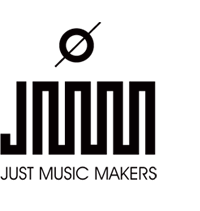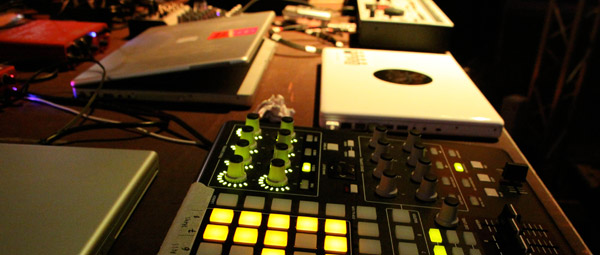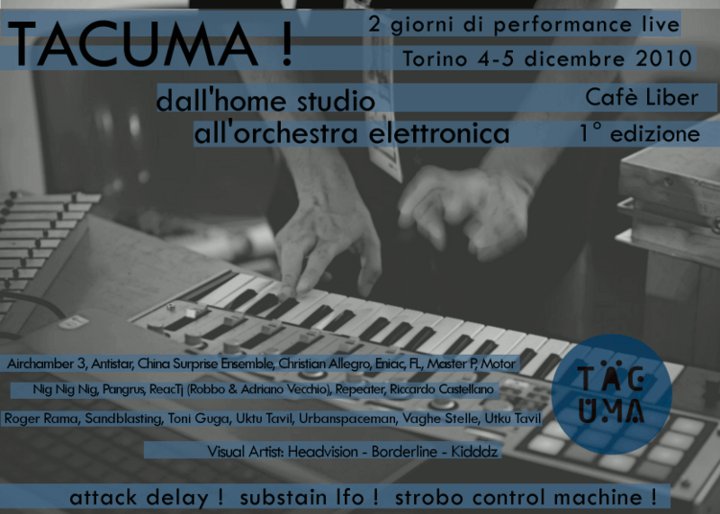TAG | Music Makers
8
Classical meets Electronic music / passEnger+xluve @ RAI Nuova Musica
0 Comments | Posted by passEnger in Live, Music
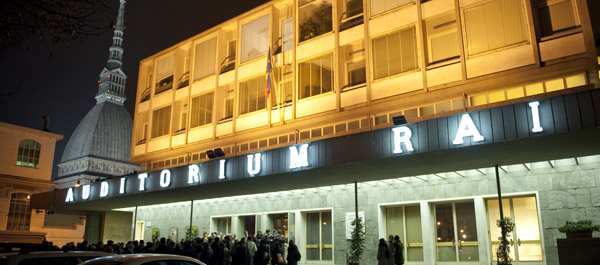
RAI Nuova Musica / The Future Sound Of Classical is an interesting appointment dedicated to the juxtaposition of contemporary classical and electronic music,
Started in 2010 by the National Symphonic Orchestra and Xplosiva Association, RAI Nuova Musica takes place in the wonderful RAI Auditorium in Torino, Italy.
Its programme usually includes a series of contemporary classical pieces performed by the RAI National Orchestra and a performance by an electronic music act. The latter usually performs a classic dj/live set and a live reworking of one of the pieces performed the same night. It’s a rare occasion in which the two worlds really can get in touch.
Me and Marco (passEnger + xluve) have been invited to perform at RAI Nuova Musica on Feb. 4th, 2011, and we delivered a special live set, in between broken rhythms, ambient/idm-ish sequences and weird machine-driven improvisations.
passEnger + xluve Live @ RAI Nuova Musica | Auditorium RAI, Torino, Italy (Feb. 4th, 2011)
In addition to the live set we were asked to rework a selected piece performed that same evening: ‘The Hague Hacking’ for two pianos and big ensemble, written by Dutch composer Louis Andriessen.
Performed by RAI National Orchestra, featuring Katia and Marielle Labècque at pianos and directed by Frank Ollu, The Hague Hacking is a beautiful, complex, 20′ piece that we reworked live using the audio from the rehearsal recorded the same morning.
Enjoy the results!
passEnger + xluve – Live Rework of ‘The Hague Hacking’ by Louis Andriessen
15
Just Music Makers #03 – The Machines, the Eclipse and the Dancers (in the shadow of the Cube)
1 Comment | Posted by passEnger in Just Music Makers Nights, Live
Here we are again, finally!
JUST MUSIC MAKERS session #3 finally took its shape…
“Eclipse at the Cube”
Home to big events like the ‘Club To Club’ and ‘Movement’ Festivals, Torino has still got room to host smaller events and push alternative ways to showcase electronic music.
At JMM, our night dedicated to the underground and stimulating side of electronic music, we always try hard, guesting electro live acts in museums or jamming machine-driven techno in rock clubs.
This time JMM discovers the intersections between live electronic music and classical/contemporary dance, hosting a clash of arts in a new, dark venue, aptly named ‘The Cube’.
After having hosted cult and underground acts like Annie Hall, Plant43, Jo Johnson and Vaghe Stelle, the new session is dedicated to the deep side of Techno, with the Turin-based label Eclipsemusic showcasing its artists and new releases.
On the music side we have the new signing to Eclipsemusic, the Barcelona based Edanticonf, plus the label’s deep/tech act Rob.Bardini, Decoside, passEnger+xluve (invited to play at december’s Bleep43 along Surgeon, Dj Pete and Donato Dozzy) and the label’s boss Francesco Stella.
On the dance side, the Paris company Karma Dance Project will perform specific choreographies to some soon-to-be published tracks from the label.
This experimental project will bring together music and dance so that each art form enhances and complements the other, making for a unique experience that will both resonate and captivate the audience..
See you in the Cube!
24
Tacuma! from plug and play to Orchestra
1 Comment | Posted by passEnger in Live, Music Makers, Technology
Nel terzo millennio le parole chiave, anche in musica, sembrano essere quelle che richiamano il ‘collettivo’, la ‘condivisione, la ‘cooperazione’, insomma, le ‘cose fatte insieme’.
Così come è fuor di dubbio che oggi le tecnologie possano permettere alla musica elettronica di nascere nel luogo più lontano rispetto ai posti votati alla condivisione, ovvero nelle camerette davanti ad un laptop, immaginando un mondo virtuale che man mano prende forma attraverso la musica.
Una volta che la musica è pronta, però, si esce fuori e si parte alla conquista degli spazi reali, che siano club, piazze o gallerie d’arte.
Molto vicino alla filosofia di Just Music Makers, il prossimo weekend (4-5 Dicembre) a Torino si terrà un mini festival/happening dove si vedranno i risultati di questo paradosso di creazione solipsista e contemporanea condivisione allargata: TACUMA! è l’occasione per far sì che questi artisti si incontrino, si esibiscano fianco a fianco al di là dei singoli generi musicali e che provino liberamente l’esperienza di condividere il proprio percorso, la propria tecnica, la propria sensazione con gli altri.
Questo è un evento in cui, appunto, estro e creatività andranno in scena sotto una luce differente, quella della condivisione. Ogni partecipante si esibisce in uno degli spazi creati ad hoc al Café Liber, un palco da concerti, un dancefloor e una sala oscura che darà spazio all’immaginario creato dai visuals.
Nella prima serata (sabato 4 Dicembre) gli artisti suoneranno le proprie creazioni; alcuni interventi performativi prevedono inoltre l’utilizzo di sensori, di apparati audio/video e di strumenti di manipolazione sonora (Reactable).
La giornata di domenica 5 Dicembre verrà proposta una versione inedita di ‘jam session’ collettiva, che coinvolgerà una decina di musicisti di diversa estrazione, i quali contribuiranno ad una sorta di orchestra elettronica.
Il frutto delle jam session sarà registrato e in seguito pubblicato su Chew-Z in libero download.
I background dei musicisti coinvolti nella prima edizione sono i più disparati: dai producer coinvolti nel night clubbing cittadino emergente agli affermati rappresentanti della nuova elettronica, dai manipolatori di avanzati strumenti elettronici agli ensemble di musica elettro-acustica.
:::::::::
Abbiamo rivolto alcune domande a Fabio Battistetti, curatore del festival.
Ciao Fabio, parlaci di ‘Tacuma!’. Come è nata l’idea?
L’idea è stata di Fabio (Cafè Liber), che l’ha poi condivisa con me. Io non mi sono tirato indietro perchè, pur non essendo uno scenester, ho sempre voglia di mettere assieme musicisti di diversa estrazione con differenti obbiettivi in una medesima sitauzione. Torino è indubbiamente una piazza importante per la musica elettronica e mi piaceva l’idea di mostrare il tessuto che c’è sotto a molti successi, la rete di musicisti è molto più vasta di quel che vedi in un club normalmente.
Quindi qual è l’obiettivo del festival?
Mettere assieme i musicisti sotto uno stesso tetto, vedere come producono, come si esibiscono e farli dialogare tra loro e con il pubblico. Qui c’è la possibilià di farlo, perchè vorrei che l’atmosfera del festival fosse la più informale possibile, e la scelta dei luoghi di esibizione va in questo senso perchè non saremo né in un club, né in un locale da concerti, né in una galleria d’arte.
Ma soprattutto sono molto curioso di sentire cosa verrà fuori dalla jam session domenicale, che per me sarà il cuore del festival.
Perchè ‘tacuma’?
Vuol dire “attacchiamo” in piemontese e applicato all’era della computer music ci sta benissimo. E al tempo stesso ha anche un po’ di spirito rock’n'roll.. one, two, tree, four!
:::::::::::
Riassumento:
TACUMA! 4-5 Dicembre presso Cafè Liber, Corso Vercelli 2, Torino.
Per tutti i dettagli e l’elenco degli artisti rimandiamo alla pagina ufficiale: tacumafest.wordpress.com
Sorry, this entry is only available in Italiano.
6
The man from the Elektron world /// Part 1 – Interview
2 Comments | Posted by xluve in Music Makers
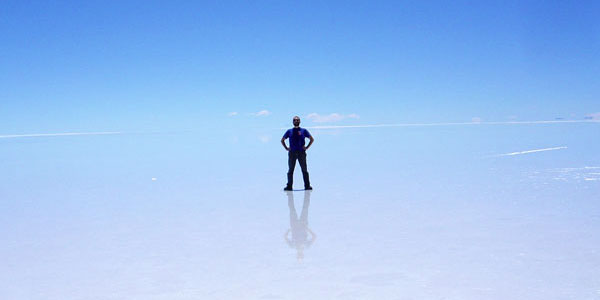
Elektron is a small but fierce Swedish brand producing drum machines and synthesizers.
Recently we attended to an Elektron demonstration session; it has been really inspiring for us, both for the quality of the machines presented, and for the skills that the demonstrator, Daniel Troberg, showed up.
Daniel is one of the original developer of the Elektron brand, and from time to time he tours the world to introduce the machines.
He’s a real passionate guy about music and work, friendly and talkative: after the demonstration we decided to do an interview with him, to go deeper into his life, his music and his work for Elektron.
Enjoy!
JMM. Hi Daniel, thank you for sharing with us your experiences
D. You are welcome ![]()
JMM. So let’s Start: where were you born?

I’m from the Aaland Islands a small demilitarized archipelago between Sweden and Finland in the Baltic Sea. It has round and about 25.000 inhabitants so it’s a really small place. It belongs to Finland but Swedish is our native tounge. We were five people in my class from 1st to 6th grade. It was both a blessing and a curse to grow up in such a small place. I occasionally visit it and sometimes I think about moving back but I don’t feel at home there, a bit sad really. Many people from the Aaland Islands travel a lot. It’s an island, you want to move. My parents divorced quite early and so I moved around quite a bit. We have always had dogs when I was a kid, at one time 15 greenland dogs and those are some vicious animals. I’m a nature guy at heart who loves animals, fishing and, recently, diving. I also enjoy travelling and I like to take long breaks when I do take a break. I enjoy cooking, Italian food is the best in the world.
What have you studied? Did you enjoyed that period?
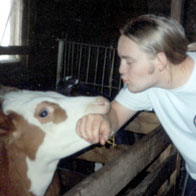
In school, my best subjects always were music and maths. After high school where I graduated in nature and science (not sure of the exact translation but I took as many mathcourses as possible, 11 as opposed to 6 I think) I studied some sound engineering in Stockholm, I read one-variable analysis (maths) at Chalmers University and I have also studied some networks and programming. Unfortunately I lost interest way too quick. I’m a straight-to-work guy. I do admire people who can get a decent degree and base their work-career on it. I just dont know how to do that.
Where did you work before Elektron?
I’m from the working class, I’m used to working all the time. My first payed job was at 12 years old, guarding a small harbour, selling gas, administrative things. I was the youngest employee there ever, it was of course in the summertime. When I was 13 I worked in Stockholm at one of Sweden’s bigger computer distributors repairing AST computers mainly and working with logistics. I was the youngest employee ever also there. I have done a lot of project based work, doing festivals, doing youth based projects and so on. I worked a short bit on the ferries in the Baltic Sea where I met my beautiful wife and then I worked at a computer retailer doing purchasing and selling computers and peripherals. I have also worked 5 years in a musicstore.
Do you drink/smoke?
No/no. On the Aaaland Islands drinking is very common and quite funnily, the Lonely Planet (backpackers’ bible) warns of scandinavian countries for this very reason. It’s not uncommon to start boozing when you are 13. But I quit all that when I turned 30, it just takes up too much time and I got frustrated when my head turned gluey, I got tired of being tired. I also don’t like drunk people, they often talk shit and behave like idiots. There are of course exceptions though.
About Elektron and machines
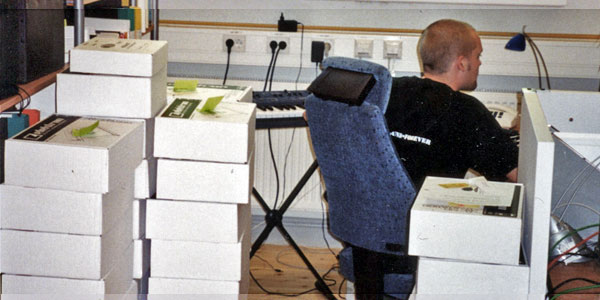
/// Daniel at Elektron Headquarters and a pile of Sidstations
When did you start to work at Elektron, how was the beginning of the story and how it developed?
I found out about Elektron by browsing around the web one day at the computer store I worked at, this was in late 1998 as the Sidstation buzz was catching on. I sent them an email and got a nice reply back. When I got that reply I immediately knew what I wanted to focus on as I was well into synths already. I moved down to Gothenburg and contacted Elektron, the first project was to write a sysex transfer utility. I utterly failed because I’m lousy at code. But I did some presets for the Sidstation and they were well received. thats how the presets to the Sidstation Ninja edition came together. At the same time I did my first public demos and there was also a Propellerheads cooperation, we made a skin for the Rebirth software featuring Sidstation samples, another guy did the graphics. I started to work at the music store and at the same time I did projects for Elektron, like the M-Audio ProSessions sample cds (one of them shared with producer Charles Storm) and fair demos and so on.
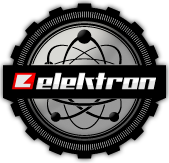
Today, I get quite a lot of props for those sounds and I’m happy that people liked them. I have heard them on some releases aswell, there’s a Soma 12″ which was quite full of them. I do think it has actually sold a couple of extra units for us which was the initial idea. I have made many of the presets on our units, it’s both good and bad and I realize that it can’t be kept that way forever. I want to point out though that we have always had a focus on showing how crazy it can sound, some people just don’t get that. They want their steady 909 beat and it is of course possible, it just kills me to do such a simple thing.
I got my first full-time employment in 2005, it worked so-so. I got my second full-time employment in 2007 and I’m still here. Of the original founders, one left quite early, one was sadly killed in a car-accident and I miss him dearly, the third one is still within the company and is the real mastermind behind our products, the invisible one. So I can proudly say I am the second longest running employee in the company.
What do you do in Elektron now?
Officially I share the sales and marketing department with another guy. I also run the support, I take care of the purchasing of much material and generally try my best to keep everybody happy by getting them candy when I’m at airports. I like to spread a good vibe. I have no economic interest in the company. I try to avoid answering emails when I’m not at work but I tend to do that anyway, I also sometimes PM people directly on the user-run elektron-users.com forum when there is some topic I find needs an urgent answer, like a support errand or someone who feels badly treated. I come from a service background and I want to help people in trouble. I’m always working and promoting the brand but I’m not the one selling the wrong type of gear for the wrong application. It will always come back and haunt you.
I also come up with ideas for products, old as new. It is a real honor seeing ideas being realized, it’s a dream! I do have a lot of stuff written down and some things fit Elektron, others don’t. It’s always a conceptual thing.
“I’m always working and promoting the brand but I’m not the one selling the wrong type of gear for the wrong application. It will always come back and haunt you.”
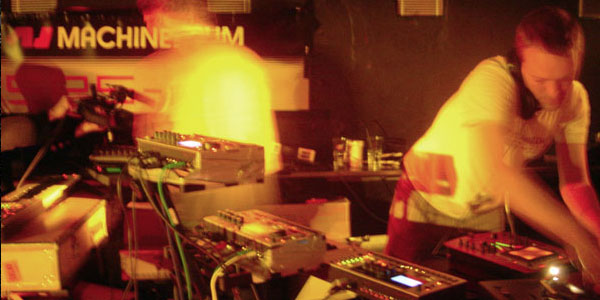
What is Elektron for you and which is the best feature you see in your machines?
For me Elektron is a dedication. It’s a marriage. It’s a balance. If I had continued in solely the computer field I would work at Apple today no doubt about that, thats how pesky I used to be. I had the chance of going to Hawaii for an exchange year and that would probably have changed a lot since I was way into computers at the time but I chose not to. I had no trouble getting into businesses one way or another. I once went over to Stockholm, brought a buddy, I forced my way into the venue where they filmed a very popular tv show where they had silicon graphics stations doing virtual reality stuff, you know standing in a ring with those huge masks on, very cyberspace. We finally got ourselves a private tour after I came to an agreement with the guy at the door and we got to try out all the gear in private, my friend literally dropped his jaw. We were two kids from the countryside in the big city, it must have looked pretty funny.
I am very humble to the fact I work at Elektron, it really is a dream in many ways because I get to meet a lot of interesting people, I see ideas realize and I can travel. Some people I meet are heroes of mine, others are nut-jobs but they are all fun and inspiring in one way or another. The industry do carry a lot of big egos, sucker dj’s and bitter people who didn’t make it as artists. I have told some people that deserved it to gently fuck off, some by eyes and others by mouth and I have no problem in doing so, we only live once you know. There is a fine balance between artistry and businessmanship within the musical instrument industry, it should contain 50/50 but sometimes it spills over too much in either direction. It’s in one end esoteric madmen who has a very hard time delivering the great stuff they invent or these chinese mass-production businesses which are so soulless it hurts. I think a lot about that, actually, I think a lot about my work.
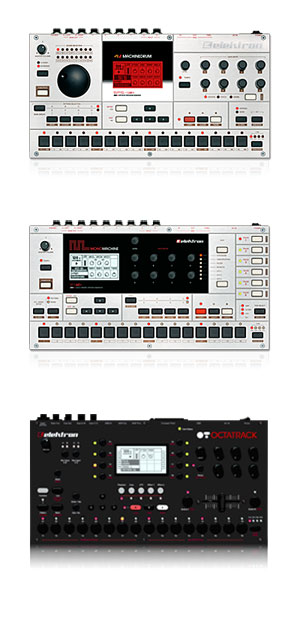
About our units, they have a user interface which talks directly to the brain. It’s not how many features you can pack in, its how you can make use of them and how you can control them. The best feature in my opinion is that they are more or less standalone products. Each product can sequence itself easily, make noises, make tracks. Even the Sidstation has a small wavetable sequencer (which you need to trigger via midi though) and for every preset you can do small loops and transpose them on the keyboard making sounds which moves and modulates. As for the sequencer in the Monomachine and Machinedrum, if any of our competitors would have done parameter lock functionality the way we did it, we wouldn’t have existed today.
“About our units, they have a user interface which talks directly to the brain. It’s not how many features you can pack in, its how you can make use of them and how you can control them.”
That’s how good I think it is. Mind, most of these features have been there from the beginning and was a result of the three originators vision. Elektron is though a joint effort and absolutely not the result of just one person.
A machine from the past that you love: what, and why?
There are many but I will pick the Technos Acxel. When I had the chance of getting one I had to pinch myself several times, I still have the Mark Vail book “Vintage Synthesizers” in its original 1993 release and I got that book in Tampere in Finland and studied it carefully back then, I was 15. On one hand, the Acxel is cool because it’s rare and looks like nothing else, you can’t get away from that but the functions that they implemented was extremely useful, doing interpolation between several parameters and controlling that with mod-wheel, velocity etc. It’s pretty basic stuff but it becomes so powerful in that synth. The interface is also beautiful because you draw the envelopes with your finger and it’s pretty much as cool as you want it to be. The downside to it is the OS never got halfway finished, I got like 0.99beta2. There’s a lot of functions which are inaccessible. I have talked quite a bit with mr Guilmette, the creator of the Acxel, and he is a really nice guy who has restarted his business and does the Acxel II now. I immediately told him that the most important thing is the physical appearance of the grapher, not the actual function of the resynthesis. It was probably crazy expensive to manufacture back then and it probably is very expensive to produce today aswell. Maybe do it as an iPad app perhaps?
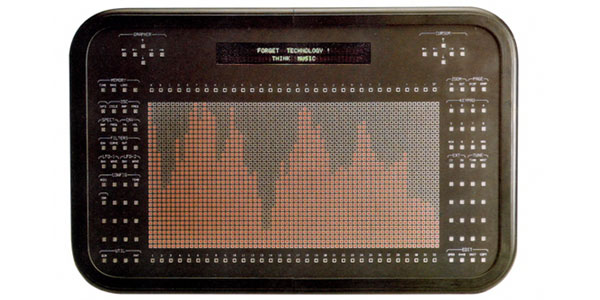
“Forget Technology! Think Music” The Technos Axcel Resynthesizer, developed in late 80′s in Canada.
A machine from the present time that you love: what, and why?
Apart from our own gear I am in love with modular systems, I know it’s not new, fun thing is they are the oldest components of electronic music gear except for the odd theremins and other more or less esoteric stuff. I think Dieter Doepfer did the world a great favour when he decided to go for the small format, we all live in smaller and smaller spaces unfortunately. Doepfer have really paved way for the popularity of eurorack, it took a while but now others have made nice modules too and all play along quite fine. There are some low quality manufacturers around but most are good and some are fantastic. Analogue Systems from the UK is like the grumpy granddad of modules, simply reliable. I’m a huge fan of the Harvestman brand. The Tyme Sefari is great fun, I think everybody with a eurorack should have at least one because it fuses sampling and analog thinking in the same way the Machinedrum UW handles it, only at control voltage level.
Tell us something about the future moves of Elektron.
Something you are developing now and something that you dream for the future.
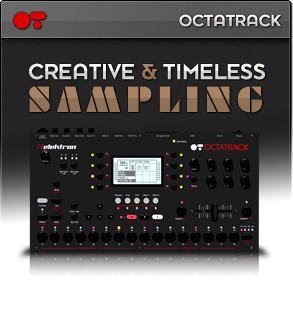
Yes, that would be nice. We are very aware of the fact many people in the business are looking at us, especially now when we showed the Octatrack at MusikMesse. We also get some strange calls and suggestions. One guy called and emailed us once and proposed that the three biggest MI companies in Sweden should get together and form a super corporation and destroy the big guys, he is probably not very sane.
We are developing the Octatrack right now and we have a scheduled release in Q4. It will put back the fun in sampling, playback, treatment and re-treatment of samples and loops, it is very cool. It’s a flexible product that caters to many sorts of musicians, some see it as mainly a dj product because of the fader but that’s just a way of controlling transitions between several values at once. It can replace many features that you would use a computer with certain types of software for nowadays but to each, their own.
“We are developing the Octatrack right now and we have a scheduled release in Q4. It will put back the fun in sampling, playback, treatment and re-treatment of samples and loops, it is very cool.”
We are not interested in doing software for computers and I believe computers as we know them today will play a smaller and smaller role in music performance. The iPad is a good example of a gadget that’s still a computer but they have remade the interface in a way which takes the dull oldschool aestethics of computer-screen-keyboard-mouse and throw it in the garbage, I’m a total apple sucker. For DAW systems, I would rather have a dedicated recording console solution. I know there are alternatives but they are still too expensive plus protools does the job just fine.
Future products, we … / aborting transmission / … / lost carrier signal /
Daniel’s Music Production
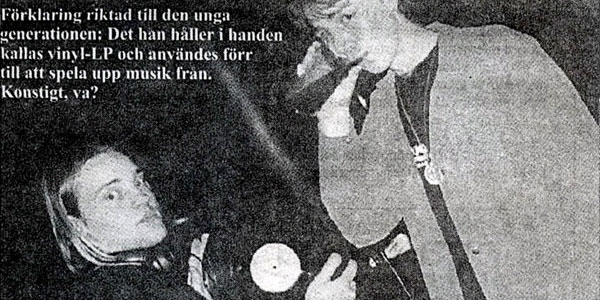
You do also produce music. When have you started and why?
When and how have you decided that it was “your way”?
I got a small keyboard when I was, like 5, 6, a Yamaha Portasound something. I immediately knew it was not the thing I wanted as there were way cooler stuff in the music store. I was never interested in learning to play others silly tunes, I made a lot of noise with it though, I loved making noise. I instantly made “experimental” music if there ever was a term like that, or was it me unable to play anything musically? Probably. We also had a lot of music on at home and I’m so grateful of that, I used to be extremely good at remembering singles and albums, be it the Beatles or Grace Jones. It must have been pretty freaky for an adult hearing me describing the coverart of several David Bowie albums. I was a mini-discogs at one point. I lost interest in new music after 2000. I started playing the trumpet once. I quit. I have never really liked guitars. I like the bass and I love Tom Jenkinson (Squarepusher).
Early on, I used to mess around with our reel to reel, a Sony which I still have and use. I used to scratch on it, record and playback on different speeds and splice loops together. When I was 12 I did some “remixes” using two tapedecks, pausing, playing back, recording and so on. We had a great public library on the Aaland Islands where you could borrow vinyls, cassettes and later on cds. I used to take home a lot of cassettes and I understood that the degradation of a cassette copy would ruin the sound so I did the copy, opened up the cassette and switched the magnetic tape. no one would notice that unless they took up the cassette and knew what was an original reel or not and if the transparent leadins of tape was present or not.
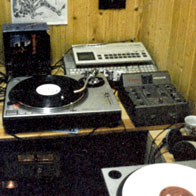
One of my best friends started djing very early on and I got to know him when I was 14, he was kind enough to lend me his turntables, some very fragile beltdrives and the classic Gemini mx2200 mixer. I bought my first 12″ in 1992 although I had a pretty nice music collection already. I was well aware of the technological aspects of djing before that, I remember the Technics dj cd player and also when the Denon arrived onto the scene, I though the Denon was very cool but I didn’t understand how the same control could be achieved like that of vinyl, mind I hadn’t tested either of them properly yet. I’m glad I passed on the Denon. When Final Scratch was released to the public, I was one of the first to get hold of it as I worked in the musicstore. I used it on several gigs in clubs and at private partys and it was a revelation as I didn’t have to drag around vinyl. It worked really well and sounded ok, using Traktor Scratch today. A magnificent and revolutionary product!
I got my first computer when I was 6, it was a Sony HitBit HB75P. like many other home computers at that time, it had a BASIC interpreter. It contained some sound commands but was nowhere near the C64. I did some noise with that but the sound was so dull I just let that be. When I was over at my friends house and played on his C64 and heard the digitized speech I freaked out totally. I started out making tracks around 1992 as I got a Gravis Ultrasound soundcard for the PC, along with the GUS tracker. I also got a used Roland D5 keyboard. I used to mic up my Cervin Vega speakers, one of those 80s really fat ones, and record the pitched down bassdrum of the GM-style drumkit from the D5 into the 8bit converters of the soundcard, that’s how I got a fat bassdrum. I worked very hard the summer of ’93 doing dishes and making salads at a restaurant, took a prepay on the complete summers income, went over to Stockholm and bought a used 808 and 909, think I payed 1000 eur for both, not such a good price as the hype was already on.
I dabbled in electronics from an early age aswell, opening up stuff and hardly being able to put them back together in working condition. I had a play set called “the little electrician” and that was fun! Before I got my Gravis soundcard I built one of those parallel port audio interfaces, it’s basically just a bunch of resistors put together but it enabled you to get sound from an Ibm pc to the stereo without having a soundcard, I was very intrigued by it.
On the Aaland islands we were three friends who put together our gear and started making tracks around 1994, it was a fun time and we had some gigs. Recently I put up a liveset from 1995 on my soundcloud. These two guys have focused on making actual music instead of going towards the technical aspects of gear as I did and they are very good at it, one guy does house oriented stuff and the other does trance. Do check them out at: http://www.youtube.com/watch?v=bu1zrNENtmw and http://soundcloud.com/trancecontrol/together-2k10-alpha-mix-002.
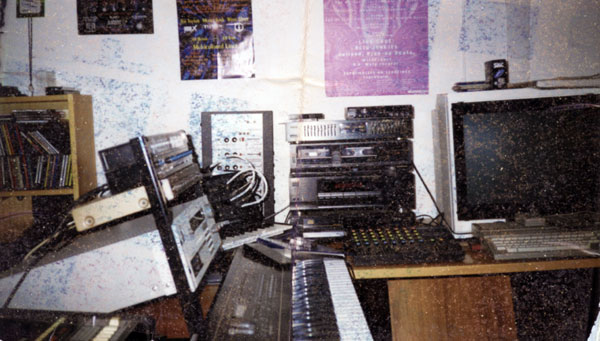
Growing up in the mid to late 80′s of course had a huge influence in my musical preferences. House music was catching on in the charts and there was of course a lot of cheese out there. I especially remember when there was a dance at school, must have been 1989. Lots of commercial house playing and one track was Lagaf’s “Bo le lavabo” and I always thought the vocals destroyed the whole track, it was extremely ridiculous. Of course, because the vocals are a piss-take on producing housemusic. And the background music? It was Lil Louis “French Kiss” and when I realized that later on, it sort of came together as I love that track. So to answer the question, when was it my way, it kind of feels like it was there from the beginning. Actually I have no idea. It feels I would not be anything if it was not for music and technology.
We know you do some production work as well.
Tell us something more about this: what do you do, how do you work and what do you use?
I like to think of it as electronic music, sometimes I’m not even referring to it as music as I’m unsure it is music, it’s just more or less organized sounds. I’m oldschool in the way I don’t care what the genre is or if I can use this sound with that sound. The music making is a therapy for me and I imagine things when I make it, from sounds to arrangement, if there is one. I listen mainly to electronic music and try to find out how they did this and that. I really enjoy the works of Joey Beltram, Dave Clarke, Burial, Mark Bell, FSOL, Cari Lekebusch, Jeff Mills, Richard D James, Marshall Jefferson (the list goes on), they are true sonic architects and in my own little world, true geniuses. I also have a sweet tooth for Chicago house, dub, funk, acid, electro, jungle, old school hiphop and so on. I like a lot of things and I do a lot of different things musically, something that I try to transfer to the preset makings of the Elektron units.
“I’m oldschool in the way I don’t care what the genre is or if I can use this sound with that sound.”
I have quite a lot of gear and I always connect things around and get a useful noise here and there. I have two recording approaches, one is multitracking in my beloved protools, the other is doing it oldschool by taking stuff into the Amek Tac mixer and manually mixing it down to a stereotrack in realtime, doing manual fades, sweeping the bands, sending to fx etc. I always fancy the latter and that’s how I used to do it when I did 5 tracks a day at the most. I was never into dub and reggae so much but the founding fathers of dub sure made the process of recording and making tracks at the mixer a whole lot more fun. I would at some point love to get a bigger mixing desk, like a 32 channel and have 32 channels into protools (meaning HD) and doing both at the same time. It’s just I can’t fit anything like that in the studio as of this moment. When I edit in protools, I always go sample level, I just zoom in and cut on point. When I want to do stutters or crazy “buffer error” effects I do that manually, I do not use plugin’s as I find it pointless. Protools still contains a bug which when duplicating regions, it is not sample accurate. It’s a real pain and they have yet to come up with a solution. A friend pointed that out to me once and my god, it’s still there!
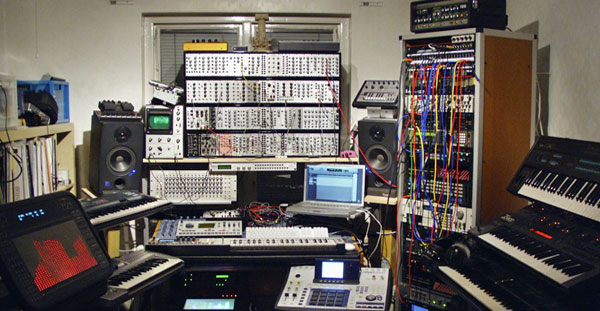
Some favourite gear includes: the Elektron stuff, Korg Prophecy, Technos Acxel, Korg707, Eventide H3000dse, Vestax dj sampler, Roland Space Echo Re3, Nord Modular G1, Tenori-on, Akai s612, Oberheim Dx, Eurorack Modular, Mpc4000, Dx7, Lemur. The list goes on.
I released some vinyls in the beginning of 2000 but vinyl was already on the decline then. I had a pressing & distribution deal through Integrale Muzique in the UK and that ended with them forcing me to pay a ridiculous amount of money and then promised me to send me the stock I had left, that didn’t happen. One of the owners took most of the stock and relocated to Berlin, a big fuck you to TSV. What comes around goes around.
The latest things I’ve gotten released were two remixes, one for swede Andreas Tilliander and one for sweden’s absolutely biggest popbands, Kent. Funnily, I could never in my mind have imagined they would get released. In my ears, these remixes are quite generic. One is a dubby Basic Channel-ish kind of thing which many people seem to like. The other is a typical noisy compressed bigroom track with synth bleeps and without the vocals. This just shows how out-of-sync I am, maybe I should try and focus on what works and do just that? It’s just I don’t care about what works or not. When it happens it happens.
Do you use software as well? What is your thought about it?
Protools is the best DAW ever, period. I also use some special software like Metasynth and I have a Korg Oasys pci running in a separate box and I think that card has some stunning sounds. As for software plugins and software synths in general, I’m not so interested in it and it’s way too timeconsuming for me to check out all the options out there. I rather work with the limitations of hardware.
I like Reaktor coupled with my Lemur, there are some fantastic Lemur templates which someone has altered for Reaktor use and suddenly, Reaktor comes alive in your hands and it gets an interface that I like and I don’t have to look at a stupid screen when modulating and sculpting sounds. The Lemur also tells me the parameters and I can flip the page and up comes another set of parameters! The running around with a mouse on a screen, midi learn, keyboard shortcuts, that should all be illegal. But its the way it is right now.
“The running around with a mouse on a screen, midi learn, keyboard shortcuts, that should all be illegal. But its the way it is right now.”
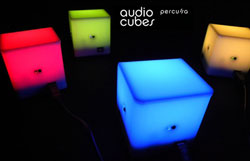
With Traktor, I use the Percussa Audiocubes. I like the visual aspect of them and I have incorporated it in a dj setup with the Lemur and Kaoss Pad. It looks great in a dark club!
How much do the instruments influence the music produced by the music makers, in general? And what about you?
I would say they often influence the user far too much than what is necessary. It’s not a bad thing, it’s just that you can actually use a synth as a drummachine or a drummachine as a synth, that’s a part of the idea of electronic music instruments as far as I’m concerned. That would also apply to recording if the person at the controls knows his stuff. Don’t just do basslines with the tb303, make leads, make fx, make bassdrums. Experiment. We did a compilation on the Aaland Islands in 1998 where my contribution was the concept of using a synth as the drummachine and the drummachine as the synth. I didn’t use a modular, I did the bassdrum and percussion on a korg707 and I did the bassline and atmospherics on a 909 thru effects. Many people have done this before but sometimes it seems to be forgotten, I say do this! Clear your head!
“Don’t just do basslines with the tb303, make leads, make fx, make bassdrums. Experiment. I say do this! Clear your head!”
The problem with many softsynths is that they ship with an extreme amount of presets, some aren’t even made for tweaking so it all becomes a big jukebox of sounds. They sound good, some sound fantastic aswell, but it really affects the music being made with them as the music will end up sounding so bloody generic that it doesn’t matter if it’s dj X or dj Y or someone else producing it. A proper work damage is of course when you are able to identify sounds and effects, it really takes away some of the magic in listening to and enjoying music.
When I mess around in the studio I always try to go as far away as possible soundwise from the gear I’m using. Sometimes I succeed, sometimes not. The process is fun and I always get some kind of sound I haven’t gotten before.
Why do you make music?
It’s first and foremost a therapeutic form where I can release all anger, stress, conflicts. I never make music for someone else. I don’t know how to do it and I have no interest in it. Some make songs for their partners or whatever but I have some sort of block where I just can’t do it. Its an emotional process and I am not very comfortable playing my music for anyone else, simply because I think it always would sound like shit to all people that listen to it. And it probably does to some, I just don’t care. The internet is great in the way you can put out your music there and just let it slowly die, it becomes a graveyard for sounds (and all other digital media for that matter). I also don’t know why and how I should perform in a band constellation, I’m not much of a musician in that sense. I’m a techy kind of guy who likes to make sounds and mess around with gear. There are thousands of us. The big difference is I like it so much I have made it my profession.
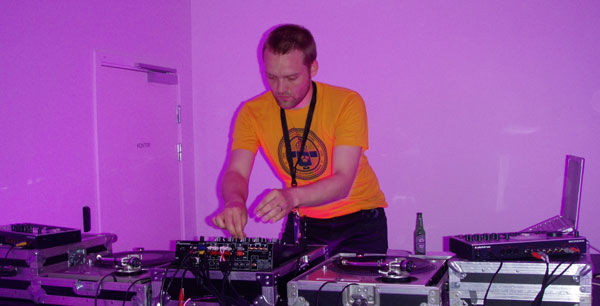
Next projects/works/productions?
It’s a continuos process, I have no idea actually. I have a lot, and I mean a lot, of material. I put out stuff on my soundcloud from time to time, great service by the way. Sometimes I remove stuff because I’m not sure it was that good or I forgot I put it up once before and removed it. I’m thinking about getting a vinyl cutter. I have several myspace accounts and I just find it fun to put out stuff and check back once every six months.
Who is a “Music Maker” today?
What does it mean to make music today?
Anybody can make music today, it’s great! Download some app on your Iphone and sound away! It’s fun and I wish the opportunity had been there when I grew up, unfortunately the music teacher on a small islands despised everything electronic as complete nonsense.
Making music today means the same as before I believe. The process of recording has become so refined although most people miss that there is still a huge difference recording in the bedroom with some plugins or doing it properly in a studio, it will in most cases sound more professional if you start out professional. Promoting music today and reaching out with it is a different thing though. If you wanna be noticeable on Beatport you need to purchase ads, isn’t that ironic? It’s almost the same thing as before but now you have to wade thru crap.
“If you wanna be noticeable on Beatport you need to purchase ads, isn’t that ironic?”
To make electronic music today is a whole lot easier than before, you can sit on the tram with your little gadget and make music, or at least sketch it. Before you had your Nintendo game & watch and played around, today your Nintendo Ds with a virtual analogue synth. It’s great! The tools for creating music today are what is best about the whole thing and it will keep getting better.
I utterly hate the music business as such, the people who are successful at it are either geniuses or evil. I think that the most successful dj’s and producers share the same drive as any businessman, because it’s mainly a business thing where the music comes second.
The world does not make room for the fragile.
/// Links
http://www.elektron.se
http://www.erasemusic.com
http://soundcloud.com/erase
http://www.youtube.com/user/erasemusic
http://www.myspace.com/djerase
http://www.discogs.com/artist/Erase
